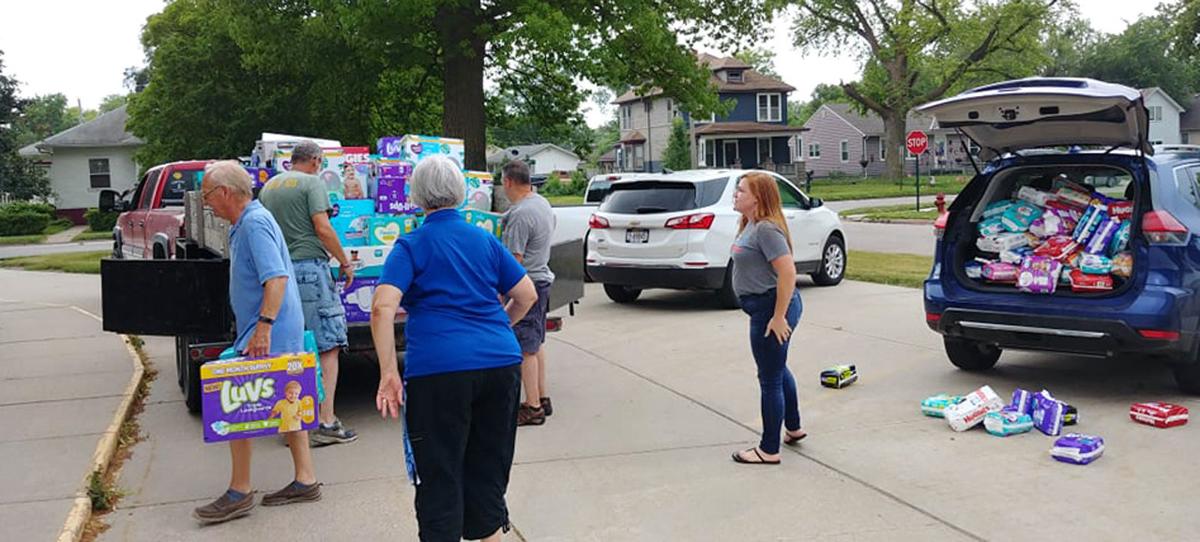Being a parent brings many wonderful moments. It also brings its fair share of not-so-wonderful surprises: ill-timed spitting-up, inconsolable crying and the incredible number of diapers such a small person can go through so quickly.
For some, the cost of diapers is an insurmountable expense.
On average, diapers cost $960 per year per child. That’s a huge burden for those with little income. For some of the lowest-income parents with infants, $960 is 14% of their annual pay.
Unlike other essentials like food and health insurance, there is no federal assistance to help low-income parents pay for diapers. Yet one-third of American families with young children cannot afford the diapers they need.
Buying in bulk can lower costs significantly. But for low-income families who live paycheck-to-paycheck, the money for a bulk store membership and the credit or capital to buy in bulk just isn’t there. And, without transportation, buying diapers at the convenience store often becomes a costly necessity.
A lower income can actually cause parents to pay twice as much for diapers.
Additionally, many day cares and early education programs will not accept a child without a daily or weekly supply of diapers. And while child care programs may be subsidized for low-income families, the diapers the parents must provide for their child to attend are not, which can make it very difficult for parents experiencing diaper need who work or go to school to keep their child enrolled.
Research by the National Diaper Bank Network estimates that 57% of parents who rely on childcare and struggle to afford diapers miss an average of four days of work or school each month because they don’t have the required diapers for their child. Many parents not only miss work but also delay changing their child’s diaper or attempt to wash out disposable diapers, or both, in order to stretch their diaper supply.
This diaper need crisis creates adverse health consequences for the child and mental stress and depression for the parents.
Research published by the American Academy of Pediatrics shows that there is a substantial unmet need for diapers in low-income families, and that children who are not adequately diapered are at greater risk for urinary tract infections, diaper dermatitis and many more trips to the doctor’s office or hospital emergency room. It also found that an insufficient diaper supply affects the mental health of mothers, which in turn negatively affects a child’s health and development.
Many who work in human services or study poverty-related issues refer to unmet diaper need as a “silent crisis.” Decades of research show poverty inescapably impedes a child’s physical, social and educational development; it irreversibly alters lives. Diaper need is only one piece of the poverty puzzle, but it’s an important piece that can actually be remedied.
It’s time we end the silence around this unnecessary hardship for children and their parents. It’s time we take action.
We estimate diaper need affects about 6,000 children ages 3 and under in Lancaster County.
To address this issue, the Junior League of Lincoln, Center for People in Need and Community Action are working together to form Lincoln’s first diaper bank. Our goal is to provide diapers for every child suffering diaper need and to distribute those diapers with the help of partner agencies throughout the city.
The National Diaper Bank Network recommends giving each child 50 diapers per month. It will take a significant amount of time and effort for the Junior League of Lincoln Diaper Bank to get to that point. But we are determined to get started and improve the quality of life for Lincoln’s children.
Hannah Norman is president of the Junior League of Lincoln. Chris Funk is executive director for the Center for People in Need.
Get opinion pieces, letters and editorials sent directly to your inbox weekly!
September 24, 2020 at 11:55AM
https://ift.tt/3045Je4
Local View: Diaper need serious issue - Lincoln Journal Star
https://ift.tt/2Comt7j
Diapers




No comments:
Post a Comment